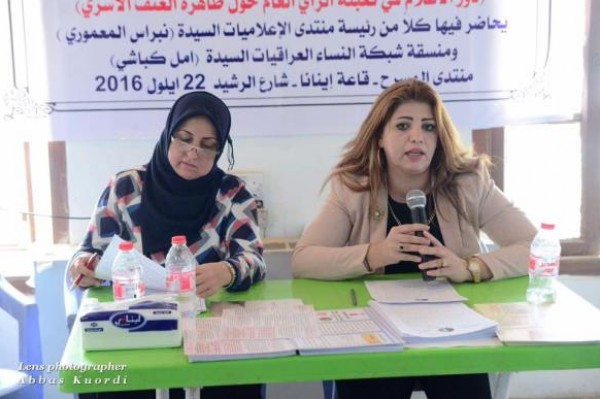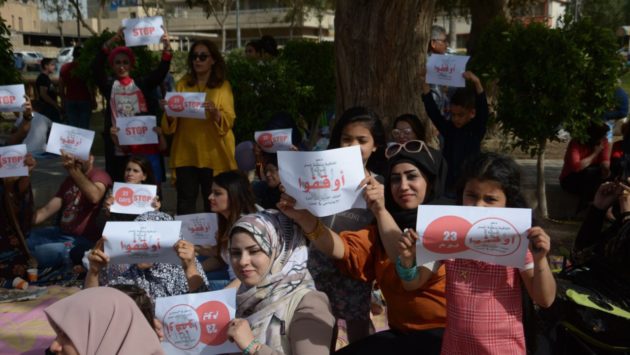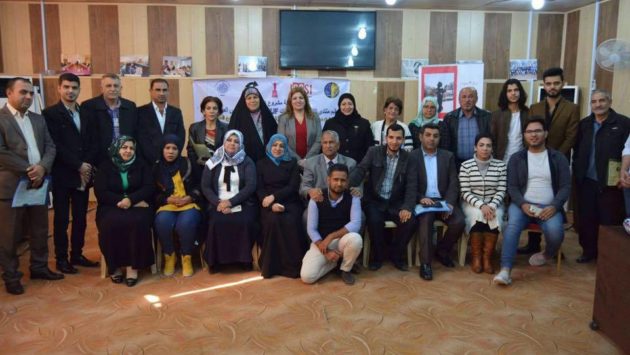The Iraqi Women’s Journalists Forum and the Iraqi Women’s Network discuss domestic violence
In the third gathering of the Iraqi Social Forum, the Iraqi Women’s Journalists Forum, supported by the Shahrazad project, held a seminar entitled ‘The role of media in raising public awareness about domestic violence. The seminar was introduced by both the head of Iraqi women Journalists, Nibras AL-Mamury, and the coordinator of the Iraqi Women’s Network, Amal Kbashi
Nibras Al-Mamury presented the results of a survey on domestic violence taken by the Iraqi Women’s Journalists Forum on a random sampling of 900 women from Baghdad, Baquba, and Diwaniya. The results revealed the prevalence of this phenomenon, and how it’s affecting the society. Nibras confirmed that the Women’s Committee of the parliament used this survey to pressure parliament into creating a law dedicated to reducing domestic violence. At the end of her speech, she focused on the role of the media in raising awareness about this crucial issue. The absence of independent media institutions in Iraq highlights the importance of the developing social journalism (citizen journalism) as an essential tool for mobilizing the public to take action against domestic violence.
Amal Kabashi, the coordinator of the Iraqi Women’s Network, introduced the role of IWN in following up on the domestic violence law project,launched in the previous parliamentary session. She confirmed that the phenomenon of domestic violence is one of the most critical issues afflicting Iraqi society, and the absence of a law directed solely at reducing its occurrence would lead to increased violence against women and children. Particularly vulnerable are minors (who may be forced to marry against their will), victims of rape, harassment and beatings (including burning), and women who are effectively prisoners in their own houses. Kabashi ended her speech by mentioning that the IWN has introduced a supplement to the draft law, including a list of imperatives aimed at ending domestic violence which are not now included in the law. In attendance were a number of members of parliament who recognize the urgency of this issue, and are waiting for parliament to vote on the most recent draft of the law, while responding to objections that it will dismantle the Iraqi family.
The audience participated in the discussion, and put forth a number of recommendations, including:
– Adopt the law immediately in order to reduce domestic violence.
– Adopt an amendment to Iraqi Penal law regarding those articles that concern familial and social crimes
– Support awareness raising campaigns and education to encourage those who have been abused not to remain silent, and to learn about their rights and recourse to the courts
– Activate the poverty reduction strategy already approved by the Council of Ministers — as of yet still unactivated — which helps people (especially youth) to find jobs and improve their standard of living
– Contribute to the development of a range of media tools to educate and guide parents in how to deal properly with children, thus developing relationships based on trust and care rather than physical and psychological punishment.
– Actively emphasize the importance of family harmony to parents, and reiterate the their key role in creating a sense of safety within the family, highlight the need to use correct methods of socialization, and stress the need for help from governmental and non-governmental institutions to raise healthy children.
– Activate some of the laws that deal with rights and freedoms guaranteed by the Constitution.
– Create safe places for victims of domestic violence which provide free psychological and medical support, as well as legal services, along with programs aimed at rehabilitation to help victims to live within the society naturally.
– Raise awareness of humanitarian law and actively protect of human rights, particularly those concerned with the protection of women and children; support gender equality among humanitarian workers and those in charge of peacekeeping.
– Provide qualified experts to work with women and children who have been exposed to violence, and support all aspects of health: psychological, educational, social and legal.
– Promote and disseminate a culture which embraces gender equality at all levels; ensure that all governmental institutions endorse social and economic policies which do not lead to the perpetuation of violence against women but rather aim to prevent — and finally, eliminate — such violence, always taking into account and benefiting from the concrete experiences of women.
– Make national laws, policies and practices compatible with the international obligations which require ridding the country of all laws that are discriminatory towards women; ensure that national legislation is in line with international human rights laws.
– Train all employees of governmental institutions (including those working in legal, medical and social affairs, the police, security forces and immigration officials) on women’s rights in particular and human rights in general to avoid the abuse of power which leads to the violation of the rights of women





